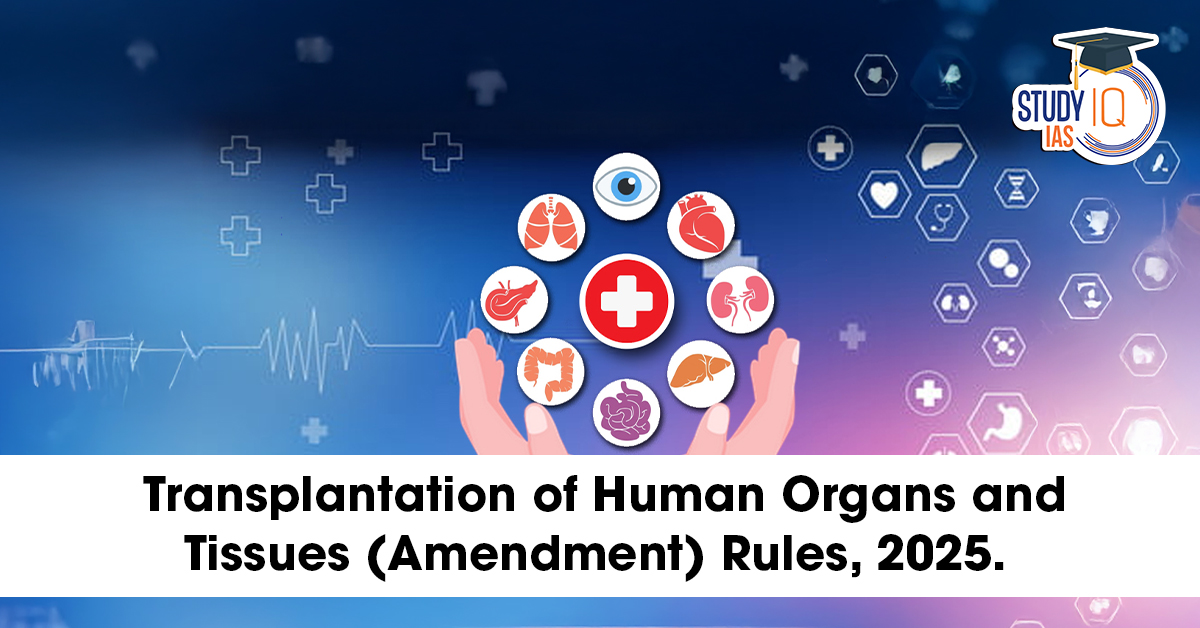Table of Contents
The Union Ministry of Health and Family Welfare has notified the Transplantation of Human Organs and Tissues (Amendment) Rules, 2025, bringing important reforms to India’s organ and tissue transplantation framework. These amendments aim to simplify corneal transplantation procedures, expand the availability of donor tissues, and improve equitable access to organ and tissue transplantation services across the country. The changes have been introduced under the Transplantation of Human Organs and Tissues Act (THOTA), 1994, which governs ethical organ donation and transplantation in India.
Why in News?
The amendment was notified to remove infrastructural barriers that smaller and mid-sized health centres face in conducting corneal transplants. By easing equipment-related requirements, the government aims to improve access to eye donation and corneal transplantation services, especially in underserved regions.
Key Highlights of the Transplantation of Human Organs and Tissues (Amendment) Rules, 2025
1. Removal of Mandatory Specular Microscope Requirement
One of the most important changes is the removal of the compulsory requirement of clinical specular microscopes for centres performing corneal transplantation.
-
Specular microscopes are used to assess endothelial cell health in the cornea.
-
These devices are costly and often unaffordable for smaller hospitals or rural eye centres.
-
By eliminating this requirement, the amendment eases operational and financial barriers, enabling more centres to conduct corneal transplants.
2. Expanding Eye Donation & Corneal Transplant Services
The amendment is expected to:
-
Increase participation of smaller eye centres
-
Enhance the availability of donated corneal tissues
-
Improve access for patients suffering from corneal blindness
This aligns with the objectives of the National Organ Transplant Programme (NOTP).
3. Promoting Equitable Healthcare
The new rules strengthen India’s commitment to equitable organ and tissue transplantation services. Regions that lacked infrastructure will now be able to:
-
Facilitate organ retrieval
-
Carry out corneal grafting
-
Improve access to transplants
This will particularly benefit rural and semi-urban areas.
4. Addressing Corneal Blindness
Corneal blindness is a major public health concern in India.
-
According to the Indian Journal of Ophthalmology, 1.2 million Indians suffer from corneal blindness.
-
25,000–30,000 new cases are added annually.
By simplifying transplantation guidelines, the amendment helps address India’s second-largest cause of blindness after cataracts.
About the Transplantation of Human Organs and Tissues Act (THOTA), 1994)
Background
Before THOTA was enacted, India relied on scattered State laws such as:
-
Bombay Corneal Grafting Act (1957)
-
Maharashtra Kidney Transplantation Act (1982)
The rise in illegal organ trade, especially kidney rackets, prompted the need for a strong national law. A committee led by Dr. L. M. Singhvi (1991) formulated recommendations that led to THOTA, 1994.
Objectives of the Act
The Act aims to:
-
Regulate removal, storage, and transplantation of human organs and tissues
-
Prevent commercial dealings in organs
-
Facilitate ethical organ donation, including from brain-dead individuals
-
Ensure transparency and accountability in transplantation processes
Key Provisions
-
Defines donors, recipients, and near relatives
-
Mandates informed consent for organ removal
-
Establishes Authorization Committees to approve certain transplant cases
-
Lays down rules for brain-death certification
-
Prevents any commercial dealings or unethical organ trading
Rules & Amendments
-
The 2011 Amendment expanded the Act to include more tissues and broaden the regulatory scope.
-
The 2014 Rules detailed operational guidelines for hospitals, retrieval centres, and tissue banks.
-
The 2025 Amendment simplifies corneal transplantation norms to improve access.
State Adoption
Since health is a State subject:
-
States must adopt THOTA for it to be applicable.
-
THOTA applies to all States and UTs except Andhra Pradesh and Telangana, which have separate legislation.
Significance of the 2025 Amendment
1. Increased Access to Transplant Services
Smaller centres can now offer corneal transplants without expensive microscopes, improving geographical access.
2. Boost to Eye Donation Movement
With more institutions participating, donor cornea availability will rise.
3. Helps Reduce Corneal Blindness Burden
More timely transplants = reduced backlog of avoidable blindness cases.
4. Strengthens National Organ Transplant Programme (NOTP)
The amendment supports NOTP’s vision of equitable, transparent, and ethical transplantation.
5. Promotes Affordable Healthcare
By easing compliance requirements, transplantation becomes more accessible and affordable for patients.
Conclusion
The Transplantation of Human Organs and Tissues (Amendment) Rules, 2025 mark a significant advancement in India’s health regulatory framework. By simplifying infrastructure needs for corneal transplantation and expanding access to tissue donation services, the amendment aims to reduce preventable blindness and make organ transplantation more inclusive. These reforms strengthen the objectives of THOTA, support the National Organ Transplant Programme, and help create a more equitable healthcare system across India.


 IT Intermediary Guidelines Amendment Rul...
IT Intermediary Guidelines Amendment Rul...
 Access and Benefit-Sharing (ABS) framewo...
Access and Benefit-Sharing (ABS) framewo...
 Henley Passport Index 2026: Ranking, Vis...
Henley Passport Index 2026: Ranking, Vis...




















